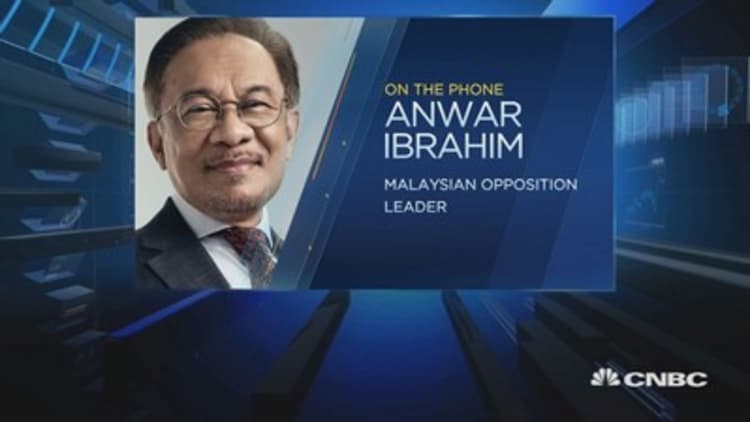
The conviction of former Malaysian Prime Minister Najib Razak presents "a renewed hope" for Malaysians who voted the ex-leader out of power two years ago, the country's top opposition political leader said Wednesday.
Najib was sentenced to 12 years in jail and handed a fine of 210 million Malaysian ringgit ($49.3 million) after he was found guilty of all seven charges in the first of his five trials linked to the financial scandal at state-owned fund 1Malaysia Development Berhad, or 1MDB.
"It is a renewed hope for Malaysians in general who were upset with the recent political development but at least they believe now that the climate for change and, finally, the voice of the people must be heard," Anwar Ibrahim, the opposition leader, told CNBC's "Squawk Box Asia."
Some observers and analysts said the fall of Najib — a former top political office holder — in the court of law was a rare occurrence in Southeast Asian politics and an important one in Malaysia's long battle against corruption.
"Former Malaysian Prime Minister Najib Razak made history ... when he became the country's highest-ranking official ever to be convicted in court," said Francis Hutchinson, senior fellow and coordinator of the Malaysia studies program at Singaporean think tank ISEAS-Yusof Ishak Institute.

The multi-billion dollar scandal at 1MDB — which involved Wall Street banking giant Goldman Sachs and Hollywood — made international headlines and involved investigations by at least six countries. Najib's alleged role in siphoning around 4 billion ringgit (nearly $1 billion) out of the state fund partly contributed to the defeat of his political coalition in the 2018 general elections.
The 67-year-old Najib, who served as Malaysia's sixth prime minister, faces a total of 42 charges in five separate trials. The charges include money laundering, abuse of power and criminal breach of trust.
'Hope for the best'
On Tuesday, the former prime minister was granted bail and a stay of execution on both the jail term and fine. He had indicated that he would appeal the verdict.
Anwar said there were some concerns that the appeal process could result in an overturn of Najib's conviction.
He explained that while the country's chief justice is known to be "protective" of the judiciary's independence, "I don't necessarily feel this is being shared by all her colleagues in the top echelon of the judiciary."
"So we hope for the best," he added.
Still, analysts hailed the ruling as a landmark decision.
"This is the first time in Malaysia's history that an ex-prime minister has been charged in court for abuse of power and corruption," said James Chin, director of Asia Institute Tasmania at the University of Tasmania in Australia.
"For a very long time, not only in Malaysia but in the whole region, it was widely understood and an unwritten rule that if you made it to the number one political office, you normally are protected from abuse of power prosecution. So I think for historical reasons, I think it's a very important case," he said on CNBC's "Squawk Box Asia" on Wednesday.
The appeal process could take many months or even years to conclude, but "it is hard to understate the importance of this case for Malaysia," said Hutchinson.
"It will help restore confidence in the country's institutions, many of which have been eroded over the past four decades," he wrote in a Tuesday note.


